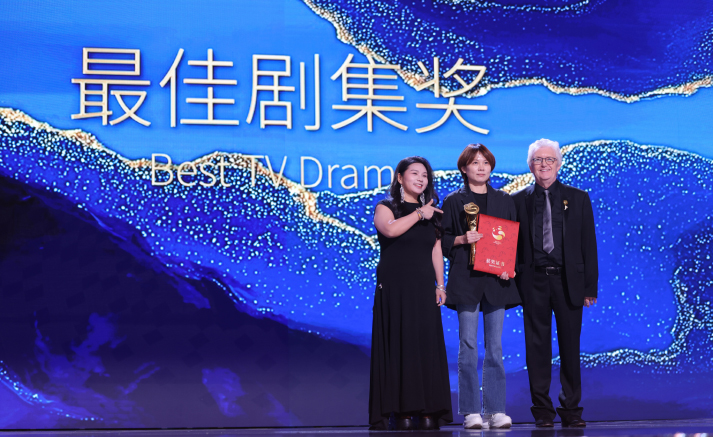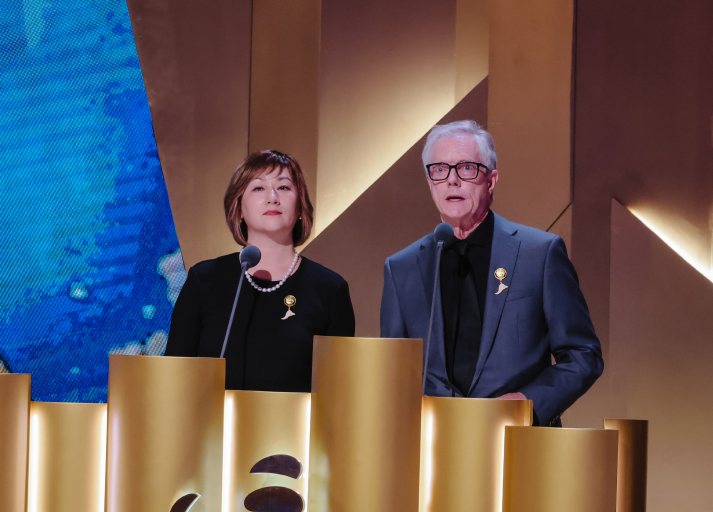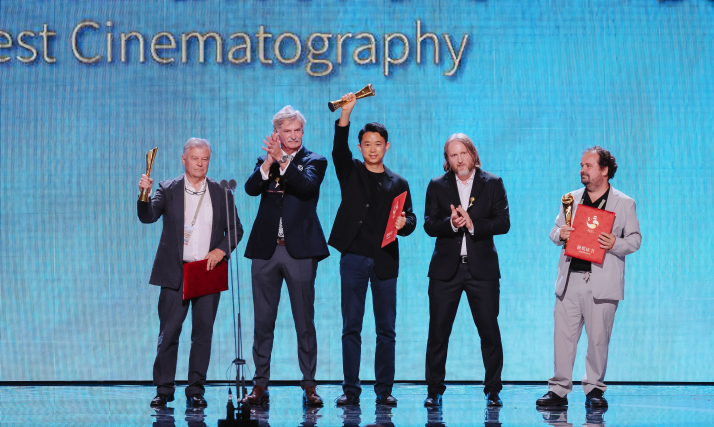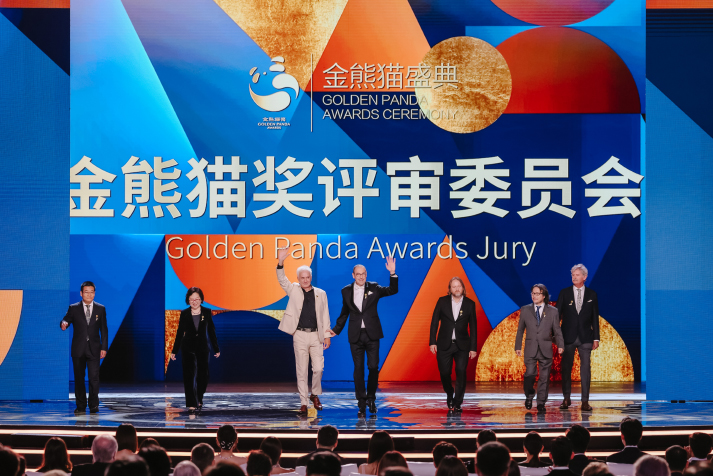| Lifestyle |
| Golden Panda Awards weave global tapestry of culture, empathy and dialogue | |
|
|
 The Second Golden Panda Awards are held in Chengdu on September 13 XINHUA
 She and Her Girls wins Best Series in the television drama category at the Second Golden Panda Awards on September 13 XINHUA
 Douglas Hans Smith (right), an American visual effects supervisor, presents the Award for Best Visual Effects in the animation category at the Second Golden Panda Awards in Chengdu, Sichuan Province, on September 13 XINHUA
 Gao Song wins Best Director in the documentary category for My Hometown Across the Ocean at the Second Golden Panda Awards
 Members of the documentary jury take to the stage at the Second Golden Panda Awards in Chengdu, Sichuan Province, on September 13
For Paola Cortellesi, the director of Italian film There's Still Tomorrow that clinched Best Picture at the Second Golden Panda Awards, the recognition is a powerful reminder: "Cinema has the power to connect us beyond borders, languages and cultures." The film, which dominated Italy's box office in 2023, tells the story of Delia, a working-class housewife suffering from domestic violence in post-war Italy during the 1940s. Her awakening begins after gaining the right to vote in the 1946 Italian institutional referendum. This work about an Italian woman's plight 78 years ago earned a high score of 9.4/10 on Douban, a major Chinese review platform. It has resonated deeply with Chinese audiences. One review reads: "Escape is good, but change is better. After today, there's still tomorrow." At the Second Golden Panda Awards, held in Chengdu, Sichuan Province, on September 12-13, 27 awards—25 across four categories in film, TV drama, animation and documentary, as well as two Special Jury awards—were granted. They were chosen from 5,343 entries from 126 countries and regions—3,910 of them from overseas, accounting for 73.2 percent of the total. This edition of the awards adopted a small jury, similar to those of the three major film festivals in Europe, which was chaired by China's renowned director Chen Kaige. The judges, all seasoned experts from different cultural backgrounds, ensured that the Golden Panda Awards emphasized artistic innovation and humanistic expression. Huang Jianxin, chair of the film jury, reflected, "The ups and downs of recent years have made one thing clear to me—the subtlety of cinema lies not only in recording the times, but also in connecting hearts." Given this year celebrates the 130th anniversary of world cinema and the 120th of Chinese cinema, these words resonated deeply with the attending audience. Through the lens The list of this year's Golden Panda Award winners paints a brilliant picture of the world's civilizations. In the animation category, Nezha: Demon Child Conquers the Sea, or Nezha 2, took home the statue—unsurprisingly so. The sequel to the original smash hit Nezha: Birth of the Demon Child, with a cumulative box office of $2.18 billion and 324 million viewers, became China's highest-grossing and most-watched animated film. From scene design to character modeling and detail, the film brims with elements and symbols of traditional Chinese culture, tightly intertwining protagonist Nezha's growth with the spirit of the times, showcasing resilience and courage in adversity. Yet more touching is the cultural dialogue behind it. American visual effects master Douglas Hans Smith told Beijing Review that Nezha 2 "delved deeper into the character, with a storyline both moving and warm. Despite the action, at its core, it is about family." What impressed him more was Chang An, which won Best Visual Effects. It is a historical animated film set against the backdrop of ancient China's Tang Dynasty (618-907). "It was my first real glimpse of the Tang Dynasty in film," Smith said. "The portrayal of famous poets and the seamless blend of artistic creation and historical narrative left a deep impression." Though he admitted that understanding culturally rich Chinese works "requires knowledge of Mandarin to grasp their essence," he was still deeply moved by their artistic charm. Cai Zhijun, chair of the animation jury, unveiled the secret of Chinese animation: "With the simplest symbols and most sincere emotions, animation awakens shared human memories," he said. "Today, Chinese animators are engaging in global dialogue with a unique aesthetic language—not a one-way expression, but mutual communication." Best Actress was awarded to Brazilian actor Denise Weinberg for her role in The Blue Trail. She portrays Teresa, a 77-year-old woman of the future. Centered on an elderly woman, the film showcases—through Weinberg's vivid and powerful performance—not only the charm of a great actor but also the moving vitality of older female characters. Best Director in the film category went to Tibetan filmmaker Pema Tseden for Snow Leopard, his eighth Tibetan-language work—and his last. Pema Tseden died of illness in 2023. Perhaps Pema Tseden was never destined to be a commercially successful director, but this award reminded people: These creations and creators remain an indispensable part of Chinese cinema. In the documentary category, Gao Song from China won Best Director for My Hometown Across the Ocean. This documentary on cultural exchange tells the story of foreign young people who, over 100 years ago, came from across the oceans to Sichuan, China, overcoming difficulties to spread knowledge through medicine and education. The film traces historical changes from 1892 to the present, highlighting the importance of cultural exchange. In the TV drama category, She and Her Girls won both Best Series and Best Screenplay. The 23-episode realistic drama centers on Chinese teacher Zhang Guimei's real-life founding of the Huaping High School for girls in China's Yunnan Province. Through the portrayal of Zhang and the ensemble cast, it depicts mountain women breaking through fate's constraints to pursue educational dreams. She and Her Girls also moved American Oscar-winning visual effect artist Joel Hynek, "I saw many excellent and inspiring series at the Golden Panda Awards, like [the 2024 hit drama series] Blossoms Shanghai. She and Her Girls particularly impressed me—it was powerful. I've seen many great works here," he told Beijing Review. Harmony without uniformity Using film and television as a vehicle, the Golden Panda Awards break down barriers of region, culture and language, offering a platform for the world's civilizations to meet as equals. Here, there is no center or periphery—only colorful, equal and inclusive coexistence. British television producer Mal Young said the awards brought him to China for the first time, an "eye-opening" experience. "It's a culture shock in the very best way," he said. Young praised Chengdu's energy and the warmth of its people. In his view, emotional connection is the most important thing for different cultures to understand each other. "No matter if we all speak a different language, we live in different countries and different cultures, we all can laugh, cry, be scared of things, be interested in things," he told Beijing Review. "I think emotional connection is the common theme throughout the world. There are things people want to see, reflections of our true lives." Visual effects artist Hynek echoed this: "Visual effects help tell a story, and any good story can cross cultural and national boundaries." His philosophy dovetails with the Golden Panda Awards' mission to promote cultural exchange through film, with the panda standing as a symbol of our shared humanity. He stressed that breaking cultural barriers requires "a better understanding of other cultures, which can only be achieved by people coming together"—which explains why a notable number of this year's jurors came from outside China. Dutch director Pieter-Rim de Kroon observed an intriguing shift: "If you looked back 10 years, you would see real differences between Eastern and Western cultures and filmmaking. But over the years, we've learned a lot from each other. Today, you can see that film style in China has really developed." Drawing on the wisdom of the ancient Chinese sage Confucius, former Greek Prime Minister George Papandreou emphasized that true harmony arises from respect for differences, not uniformity. He stressed that in an age of rapid advances in AI, biotechnology and nuclear energy, empathy and cooperation are more essential than ever to building a just and prosperous future for all. Chen called for breaking cognitive barriers. "Only when we open ourselves to other cultures, lives and values can the flow of civilization truly begin," he said. Swiss actor and director Vincent Perez, drawing from his own multicultural background, added, "True collaboration begins when we sit together and listen." This is the real meaning of the Golden Panda. BR (Print Edition Title: The Stories That Bind) Copyedited by Elsbeth van Paridon Comments to taozihui@cicgamericas.com |
|
||||||||||||||||||||||||||||||
|